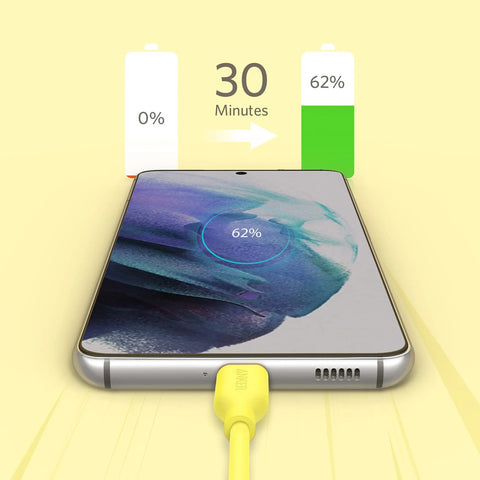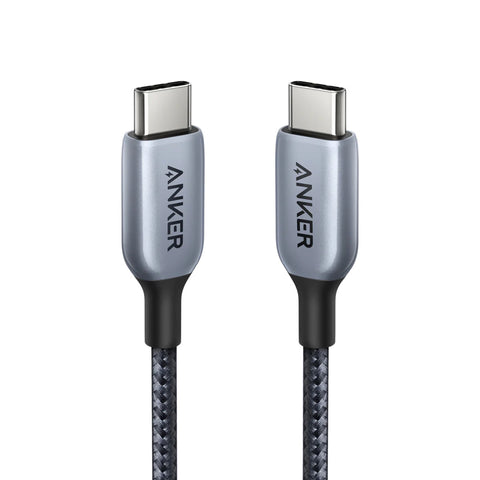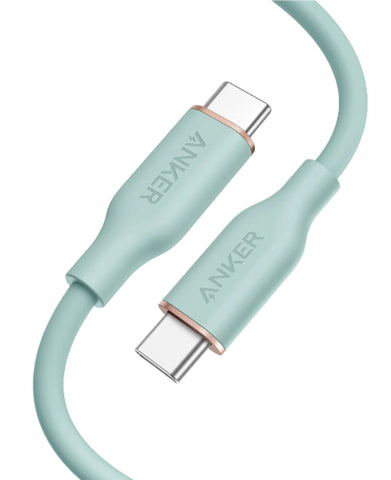
Are All USB-C Fast Charging: Disentangling Myths and Facts
Share
Facing the critical need for efficient and time-saving technology in our daily lives, it's worth exploring the subject—Are all USB-C fast charging? Diving right into the discussion, this article will seek to unravel the nature of a fast-charging USB-C cable and expound on its significant advantages. Moreover, we'll delve into various factors that have the potential to influence the fast charging capability, ensuring a well-rounded comprehension of USB-C fast charging technology.

H2: What Is a Fast Charging USB-C Cable?
A fast-charging USB-C cable is a type of cable designed to efficiently and quickly recharge devices using the Universal Serial Bus (USB) Type-C connector. USB-C is a modern and multi-functional interface that has become increasingly well-known due to its versatility and robustness. Does a USB-C charge faster? In terms of charging capabilities, USB-C cables support fast charging, allowing devices to receive more power and recharge at a faster rate compared to traditional USB cables.
H2: Advantages of a Fast Charging USB-C Cable
Listed below are some benefits of using USB-C cables that support fast charging:
Speed: Do USB-C cables charge faster? By far, the most significant benefit of USB-C is speed. On compatible devices, fast charging can drastically reduce the time it takes your device to reach a full charge. This is particularly advantageous for users who use their devices heavily or for those who may need to recharge devices quickly during short breaks or commutes.
Reversibility: Unlike previous versions of USB, the USB-C is reversible, which means it can be inserted into any device with either side facing up. This design creates an ease of connection that is refreshingly user-friendly and prevents damage to the cable and the device.
Versatility: USB-C cables are becoming increasingly standard across a wide range of devices, such as smartphones, tablets, laptops, and even gaming consoles. Owning a fast-charging USB-C cable means you can use the same cable to quickly and efficiently charge multiple types of devices.
High Power Delivery: USB-C cables support USB Power Delivery (USB PD), a fast charging standard. For those asking does a USB-C cable charge faster, this is it. Devices that support USB PD can charge up to 70% faster than older devices. The highest power output allowed by USB PD can even enable charging of larger devices like laptops.
Data Transfer: Besides charging, USB-C cables also allow for faster data transfer compared to older USB forms. At full capacity, USB-C can transfer data at a speed up to 10 Gbps (gigabits per second), twice as fast as USB 3.0.
Do you need USB-C for fast charging? For those on the lookout for USB-C cables that encapsulate all these benefits, we at Anker have just the right options.
Anker 765 USB-C to USB-C Cable (140W Nylon)
The Anker 765 USB-C to USB-C Cable (140W Nylon) delivers powerful, high-speed charging up to 140W. Compatible with USB Power Delivery 3.1, it charges various devices from phones to laptops. Thanks to its lifespan of 35,000 bends, it can handle everyday use with ease, exhibiting its durability.

Anker 643 USB-C to USB-C Cable (Flow, Silicone)
Experience a whole new feel with the Anker 643 USB-C to USB-C Cable (Flow, Silicone). Not only is it soft and comfortable to handle, but it's also robust enough to resist a 25,000-bend lifespan. Featuring 100W fast charging, it can power up all USB-C devices effortlessly while remaining tangle-free.

Factors Influencing Fast Charging
There are several key factors that influence the efficiency and effectiveness of fast charging, including:
USB-C Types
The USB-C connector is rapidly becoming the standard for new devices due to its ability to deliver high-speed data transfer and power. However, not all USB-C ports are created equal. The capacity for power delivery is notably different, depending on whether it's a USB-C 2.0, 3.0, 3.1, 3.2, or Type-C 4, with each having their own power provisions.
Cable Certification
The cable used for fast charging also plays a crucial role. Certified cables (for instance, those that have undergone USB-IF certification) ensure safe, high-speed power delivery optimized for fast charging. Proper cabling can sustain higher amperage leading to faster charging times. Also, an uncertified or faulty cable can cause damage to the battery or to the device itself.
Device Compatibility
The device being charged has a significant impact on fast charging capability. Each device comes with a specific power rating that can limit how fast the battery can be charged safely. Moreover, devices may require specific charging protocols such as USB Power Delivery (USB-PD), Qualcomm Quick Charge, or others.
Environmental Conditions
Environmental factors like temperature and altitude level can influence the charging efficiency. High heat can cause the battery to charge slowly, as heat essentially causes resistance and can damage both the battery and the device. Higher altitudes may result in longer charging times due to lowered voltage spaces.
Conclusion
In the journey to understand USB-C technology, a pivotal question emerges: are all USB-C cables fast charging? The answer, as explored, is no. While the USB-C format is versatile and advanced, not every USB-C cable is designed or certified for fast charging. The speed and efficiency of charging are influenced by various factors, including USB-C types, specific cable certifications, device compatibility, and even environmental conditions. Thus, while the benefits of fast charging USB-C cables are clear, it's crucial to ensure that you are indeed using a cable that meets the required standards for fast charging to experience those advantages fully.
FAQ
Here are some commonly asked questions regarding "Are all USB-C fast charging?".
How do I know if my USB-C cable is fast charging?
To determine if your USB-C cable supports fast charging, review its specifications, typically found on the packaging or product description. Look for features like Power Delivery (PD) support, high wattage (18W or higher), and a USB 3.1 or later version. Also, ensure that the connected devices and charging adapters are also compatible with fast charging standards.
Why do some USB-C cables charge slowly?
Can all USB-C cable fast charge? Definitely not and some of these USB-C cables charge slowly due to factors such as lower-quality materials, thicker insulation, or longer length, which can increase resistance and limit power transmission. Another reason is that these cables might not support Power Delivery or other fast charging protocols. Lastly, charging slowly could be a result of incompatibility between the charging devices, adapters, and the cable itself.
What determines a USB-C cable's fast charging capability?
A USB-C cable's fast charging capability is determined by its support for fast charging standards, such as Power Delivery or Qualcomm Quick Charge, the quality of materials and construction, and compatibility with connected devices and charging adapters. Furthermore, factors like cable length and conductor thickness affect the charging rate since they influence electrical resistance and power transmission.